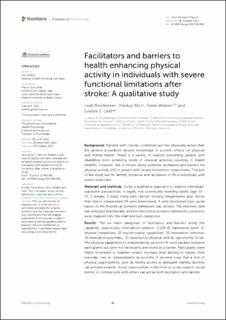Bitte benutzen Sie diese Kennung, um auf die Ressource zu verweisen:
https://doi.org/10.21256/zhaw-25884| Publikationstyp: | Beitrag in wissenschaftlicher Zeitschrift |
| Art der Begutachtung: | Open peer review |
| Titel: | Facilitators and barriers to health enhancing physical activity in individuals with severe functional limitations after stroke: A qualitative study |
| Autor/-in: | Reicherzer, Leah Wirz, Markus Wieber, Frank Graf, Eveline |
| et. al: | No |
| DOI: | 10.3389/fpsyg.2022.982302 10.21256/zhaw-25884 |
| Erschienen in: | Frontiers in Psychology |
| Band(Heft): | 13 |
| Heft: | 982302 |
| Erscheinungsdatum: | 2022 |
| Verlag / Hrsg. Institution: | Frontiers Research Foundation |
| ISSN: | 1664-1078 |
| Sprache: | Englisch |
| Schlagwörter: | Health enhancing physical activity; Stroke; Behavior change wheel (BCW); Capability, opportunity, motivation-behavior (COM-B); Theoretical domains framework (TDF) |
| Fachgebiet (DDC): | 616.8: Neurologie und Krankheiten des Nervensystems |
| Zusammenfassung: | Background: Patients with chronic conditions are less physically active than the general population despite knowledge of positive effects on physical and mental health. There is a variety of reasons preventing people with disabilities from achieving levels of physical activities resulting in health benefits. However, less is known about potential facilitators and barriers for physical activity (PA) in people with severe movement impairments. The aim of this study was to identify obstacles and facilitators of PA in individuals with severe disabilities. Materials and methods: Using a qualitative approach to explore individuals’ subjective perspectives in depth, five community-dwelling adults (age 52–72, 2 female, 3 male) living with chronic mobility impairments after stroke that restrict independent PA were interviewed. A semi structured topic guide based on the theoretical domains framework was utilized. The interview data was analyzed thematically, and the theoretical domains framework constructs were mapped onto the main and sub-categories. Results: The six main categories of facilitators and barriers along the capability, opportunity, motivation–behavior (COM-B) framework were: (1) physical capabilities, (2) psychological capabilities, (3) motivation reflective, (4) motivation automatic, (5) opportunity physical, and (6) opportunity social. The physical capabilities to independently perform PA were variable between participants but were not necessarily perceived as a barrier. Participants were highly motivated to maintain and/or increase their abilities to master their everyday lives as independently as possible. It became clear that a lack of physical opportunities, such as having access to adequate training facilities can present a barrier. Social opportunities in the form of social support, social norms, or comparisons with others can act as both facilitators and barriers. Conclusion: While confirming known barriers and facilitators that impact the ability of individuals with functional limitations to be active, the findings highlight the need and opportunities for comprehensive service models based on interdisciplinary collaborations. |
| URI: | https://digitalcollection.zhaw.ch/handle/11475/25884 |
| Volltext Version: | Publizierte Version |
| Lizenz (gemäss Verlagsvertrag): | CC BY 4.0: Namensnennung 4.0 International |
| Departement: | Gesundheit |
| Organisationseinheit: | Institut für Physiotherapie (IPT) Institut für Public Health (IPH) |
| Enthalten in den Sammlungen: | Publikationen Gesundheit |
Dateien zu dieser Ressource:
| Datei | Beschreibung | Größe | Format | |
|---|---|---|---|---|
| 2022_Reicherzer-etal_Facilitators-barriers-health-enhancing-physical-activity-after-stroke.pdf | 2.59 MB | Adobe PDF |  Öffnen/Anzeigen |
Zur Langanzeige
Reicherzer, L., Wirz, M., Wieber, F., & Graf, E. (2022). Facilitators and barriers to health enhancing physical activity in individuals with severe functional limitations after stroke: A qualitative study. Frontiers in Psychology, 13(982302). https://doi.org/10.3389/fpsyg.2022.982302
Reicherzer, L. et al. (2022) ‘Facilitators and barriers to health enhancing physical activity in individuals with severe functional limitations after stroke: A qualitative study’, Frontiers in Psychology, 13(982302). Available at: https://doi.org/10.3389/fpsyg.2022.982302.
L. Reicherzer, M. Wirz, F. Wieber, and E. Graf, “Facilitators and barriers to health enhancing physical activity in individuals with severe functional limitations after stroke: A qualitative study,” Frontiers in Psychology, vol. 13, no. 982302, 2022, doi: 10.3389/fpsyg.2022.982302.
REICHERZER, Leah, Markus WIRZ, Frank WIEBER und Eveline GRAF, 2022. Facilitators and barriers to health enhancing physical activity in individuals with severe functional limitations after stroke: A qualitative study. Frontiers in Psychology. 2022. Bd. 13, Nr. 982302. DOI 10.3389/fpsyg.2022.982302
Reicherzer, Leah, Markus Wirz, Frank Wieber, and Eveline Graf. 2022. “Facilitators and Barriers to Health Enhancing Physical Activity in Individuals with Severe Functional Limitations after Stroke: A Qualitative Study.” Frontiers in Psychology 13 (982302). https://doi.org/10.3389/fpsyg.2022.982302.
Reicherzer, Leah, et al. “Facilitators and Barriers to Health Enhancing Physical Activity in Individuals with Severe Functional Limitations after Stroke: A Qualitative Study.” Frontiers in Psychology, vol. 13, no. 982302, 2022, https://doi.org/10.3389/fpsyg.2022.982302.
Alle Ressourcen in diesem Repository sind urheberrechtlich geschützt, soweit nicht anderweitig angezeigt.